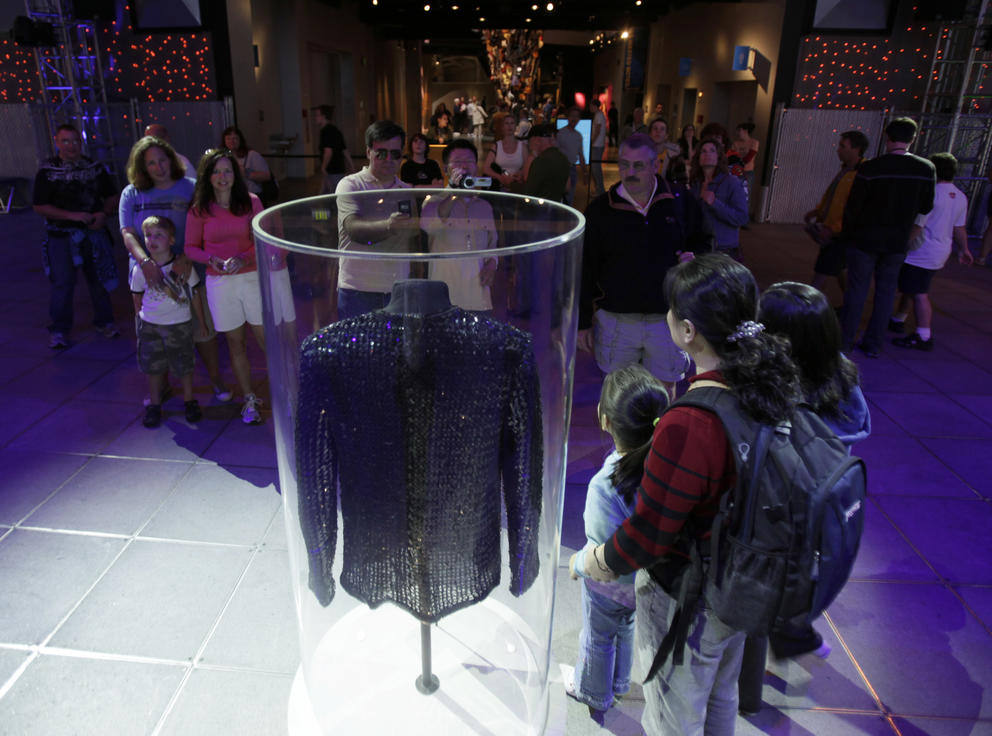The vinyl specialist is 52-year-old flannel-wearing Andy, who declined to give his last name. He’s worked at Easy Street for four years. He says he’s talked more about Michael Jackson in the past month than ever before.
“This is where you would come to talk about it,” said Andy. “I find lots of people are coming in to talk about it, people are curious about it. They’re wondering if we’re selling less Jackson records.”
Following the release of the four-hour-long Leaving Neverland documentary earlier this month, the public is wrestling with the graphic testimonial allegations of child sex abuse against Jackson and worldwide adoration of the pop culture demigod. A backlash has involved less radio airplay of Jackson’s music and some stations vowing to never play him again. All the while committed fans have flooded the internet, coming to his defense.
Andy said there’s been a dip in sales of Jackson records at the iconic store on the corner of California Avenue and Alaska Street. Not only that, he said what would once be considered a valuable Jackson record — like a vintage 1982 Thriller LP — would probably be bought for far less now than a month ago. He’s also noticed fewer children thumbing through the Jackson collection than before.
Rather than eliminating Jackson from the airwaves, Andy said he hopes the documentary changes the pervasive and sometimes unchecked culture of the music industry. He’s been working in the record industry since 1987.
“If this means an awakening, if it means it can help change the culture and some bad behaviors than I think that’s great,” he said. “More than just not playing a song.”
“I like ‘Billy Jean’, it’s a good song, but ‘Pretty Young Thing’ is off my playlist,” he acknowledged.
On Thursday, the Jackson section at Easy Street sat fully stocked: the 25th anniversary Bad record selling for $40, the multicolored Invincible set priced at $35 and Dangerous going for $37.
We checked in with others in Seattle about how they’re handling (or not) the collective aftershock following the graphic allegations against the King of Pop.
“So long Moonwalker”
Belltown’s Jupiter Bar used to house the 1990 Sega video game Michael Jackson’s Moonwalker. But then Leaving Neverland was released and the game was gone.
Moonwalker opens up with an 8-bit version of “Smooth Criminal” in the background as players control a light-wielding and dancing Jackson. In it Jackson is a hero, moving from level to level and saving trapped children from mobsters and futuristic armed forces.
A now-deleted post published March 6 on Jupiter’s Instagram account shows the arcade cabinet captioned “so long Moonwalker.” The cabinet can be seen with a mural of Jackson on the side painted by Jupiter’s owner, Joey Nix, during a Jackson-themed event in 2017.
“No one is claiming to be ‘woke’ here,” a comment made by the Jupiter Instagram account reads. “It wasn’t my game and even though we all grew up and love MJ, once I watched the doc it definitely hit me harder as an adult that we should not be celebrating him, so I had my vendor pull it.”
The comment continues, explaining that “the best part is it’s my bar and I’m allowed to do what I want and I decided to remove the game… If you have a problem with us doing this, it’s real easy to just not come back to the bar.”
Nix declined a request to be interviewed.
KEXP discusses "a slippery slope"
The day before Leaving Neverland aired on HBO, KEXP’s John Richards discussed where to draw the line on playing artists accused of abuse with DJs Sharlese Metcalf, Morgan Chosnyk and lead singer of the band Cumulus, Alexandra Niedzialkowski. They spoke on KEXP’s Sound and Vision show. The 20-minute discussion can be found online.
Richards tells the group the topic of playing artists with “questionable behavior” had recently been extensively discussed during a DJ meeting, but no easy answer had surfaced.
“This all started when we got the news about Ryan Adams,” says Richards, about the musician who has recently had an FBI investigation launched against him for preying on underage women. “An artist who got quite a bit a play over the years at KEXP — now someone can look at Ryan Adams and that one seems easy, but what about a Michael Jackson or James Brown, artists that aren’t with us anymore?”
Brown was accused of severe domestic violence and physical abuse by his daughter.
The group’s conversation weighs in on what it’s like to be a woman listening to the music made by such men, censorship, the responsibility of being a gatekeeper and what it means to hold musicians accountable.
“They’re not gods, they’re a business, they’re selling their art for money so they should be acting like a professional business,” Chosnyk says.
A spokesperson for KEXP told Crosscut that Michael Jackson is not a core artist played on air and declined all interview requests.
Get the latest in local arts and culture
This weekly newsletter brings arts news and cultural events straight to your inbox.
Radio silence
Hot 103.7, Seattle's throwback radio station, bumps all the bangers from some of Jackson’s prime eras, the ’80s and ’90s, including the king’s own music. Hot 103.7 is owned by the Entercomm Communications Corp.
Calls and emails to the program director, Eric Powers, were not returned. Similarly, 103.7 morning show host Sir Mix-A-Lot (who spoke to KING 5 about Jackson’s legacy following his death in 2009) said through his manager that he was asked by Entercomm not to comment at this time.
MoPOP and the glove
During MoPOP’s Black History Month exhibit last month, Michael Jackson’s sequined jacket and single bejeweled glove were on display “from the vault,” according to its online webpage.
The artifacts have since been removed, along with the rest of the exhibit, which has ended. Whether the glove and jacket were put back into the MoPOP archives is unknown.
A MoPOP representative said the museum did not have any comment to add at this time and declined an interview.
Laser Dome retires Laser MJ
Like Jupiter, the Pacific Science Center will rid itself of its Jackson nostalgia as well.
In a statement, Danielle Cobb, a spokesperson for the Pacific Science Center, said the organization doesn’t “hold an opinion on the validity of the accusations against Michael Jackson in the documentary,” but that the decision to immediately remove the star from the lineup was made because “we do believe that attending a laser show featuring his music could be upsetting to some of our guests.”
How recent or how frequently a Jackson laser show was played could not be answered by Cobb, who said the main contact for the Laser Dome was on vacation.
The tributes must go on
Fremont’s Nectar Lounge has taken a different route. The venue is set to host the Prince and Michael Jackson Experience music in July and the Jackson tribute band Who’s Bad: The Ultimate Michael Jackson Experience in August.
In a statement from Nectar’s spokesperson Aarin Wright, the venue said it would be moving forward with the events as the contracts with the performers are finalized.
“We recognize this to be an extremely delicate situation, but we want to leave it up to our patrons to make the decision on whether they would like to attend or not,” Wright said in an email. “In the past, these events have been a celebration of important pop contributions to the music world, versus the life of an artist.”
Wright said any further questions should be directed toward the performers. A representative for Who’s Bad did not respond to emails and DJ Dave Paul, who remixes music as part of the Prince and Michael Jackson Experience, declined to speak on the record.




